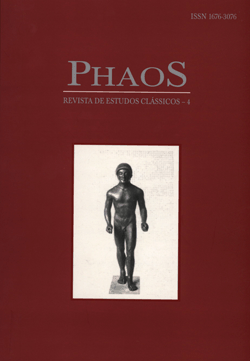Primus aut uetus? Novedad y arcaísmo en la poética enniana
Palavras-chave:
Ennius. Archaic poetry. Aesthetics. Innovation.Resumo
Ennius is well known as the "foundational father". Later authors found in his person a referent: our poet lays the foundation in his plays for the values that will shape Roman imaginary for centuries; he builts an epic and mythical Roman past and leads it to a "literary" category. Nevertheless, Ennius, who started the tradition these authors will consolidate, is frequently presented as an "archaic poet". This way of denominating him hides several opinions, fram praise and critique to compliance and contempt. We should not forget, anyway, that his archaism is a later construction which usually does not allow us to understand the way his coetaneous perceived his art. Ennius, studied fram his own context of praduction, is an innovating poet, conscious of his place in tradition and of the break his proposal produces on the previous literary backgroundReferências
BARCHIESI, M. (1962) Nevio Epico. Padova: Cedam.
BETTINI, M. (1979) Studi e note su Ennio. Pisa: Giardini Editori e Stampatori.
BRINK, C. (1972) "Ennius and the Hellenistic Worship of Homer". AJPh XCIII, na 4, 1972, p. 547-567.
CORDIER, A. (1947) Les débuts de l'hexamètre latin - Ennius. Publications de la faculté des Lettres de l'Université de Lille. Paris: Librairie Philosophique J. Vrin.
DANGEL, J. (1997) "Faunes, Camenes et Muses: le premier art poétique latin?". Bollettino di Studi Latini, Anno XXVII, fascicolo I. Napoli: Loffredo Editore, pp. 3-33.
DOMINIK, W. (1993) "From Greece to Rome: Ennius' Annales". In: BOYLE, J. (ed.) Roman Epic. London and New York: Routledge, p. 37-58.
EDMUNDS, L. (2001) Intertextuality and the reading of Roman poetry. Baltimore: Johns Hopkins University Press.
GAMBERALE, L. (1989) "Gli Annali di Ennio alla scuola del Grammaticus". Rivista di filologia c1assica 117, p. 49-56.
GOLDBERG, S. (1995) Epic in Republican Rome. New York/Oxford: Oxford University Press.
HABINEK, T. (1998) The politics of Latin Literature: writing, identity and Empire in ancient Rome. Princeton, New Jersey: Princeton University Press.
HINDS, S. (1998) Allusion and intertext. Cambridge: Cambridge University Press.
JOCELYN, H. (1972) "The poems of Quintus Ennius". ANRWI, 2, p. 987-1026.
LEIGH, M. (2000) "Primitivism and power: the beginnings of Latin literature". In: TAPLIN, O. (ed.) Literature in the Roman World. Oxford: Oxford University Press, p. 4-26.
MAGNO, P. (1982) "I modelli greci negli Annales di Ennio". Latomus XLI, fase. 3, p. 477-491.
MARIOTTI, S. (1991) Lezioni su Ennio. Urbino: QuattroVenti.
REGGIANI, R. (1979) I proemi degli Annales di Ennio: programma letterario e polemica. Roma: Edizioni deU' Ateneo & Bizzarri.
SHACKLETON BAILEY, D. (1983) "Cicero and Early Latin Prose". ICS VIII.2, p. 239-249.
SKUTSCH, O. (1968) Studia enniana. London: The Athlone Press.
SKUTSCH, O. (1985) (ed.) The Annals of Q Ennius. Oxford: Clarendon Press.
STEUART, E. (1921) "The earliest narrative poetry of Rome". CQ 15, p. 31-Z
TUROLLA, E. (1957) Poesia e poeti dell'antico mondo. Padova: Cedam.
WASZINK, J. H. "The proem of the Annales of Ennius". Mnemosyne III, 1950, p. 217-240.
Downloads
Publicado
Edição
Seção
Licença
Ao se submeterem textos para a PhaoS, seus autores devem estar cientes de que, se aprovados para publicação, a revista terá sobre eles todos os direitos autorais pertinentes. Originais não serão devolvidos.

